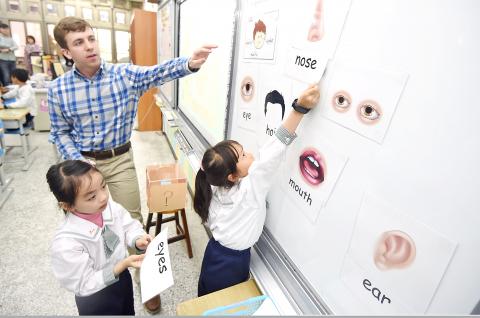Education officials last month proposed making oral English tests part of college entrance exams and establishing English-language TV channels to boost the public’s English skills as the Ministry of Education worked on plans to realize Premier William Lai’s (賴清德) goal of making English an official language
The officials made the proposals at a ministry conference about English proficiency in Taipei, where College Entrance Exam Center Director Liu Meng-chi (劉孟奇) said that oral English proficiency tests should be included in public university entrance exams.
“China is poised to implement such tests in the next two or three years and Hong Kong has done so many years ago,” he said. “To maintain its international competitiveness, Taiwan must not fall behind in English proficiency.”

Photo: Chien Jung-fong, Taipei Times
The Test of English as a Foreign Language and other privately administered English tests use voice recordings of the test taker for grading, which is a method the center could adopt, Liu said.
If such tests were conducted concurrently with English listening comprehension tests or the General Scholastic Ability Test, applicants would not have to spend days taking exams, he added.
If the proposal is accepted, the center would need five years and NT$3 billion (US$97.28 million) to establish standardized test venues at 300 to 500 schools, Liu said.
The ministry does not have a definite plan on the form of the oral test or grading methods, Department of Higher Education Director-General Chu Hung-chang (朱俊彰) said, adding that the center and the Joint Board of College Recruitment Commission would convene to discuss the matter.
The ministry said it would launch courses taught exclusively in English at colleges and universities.
Mandatory English courses would be organized by proficiency level at more than 80 percent of colleges and universities, while 85 percent of the institutions would leverage dual-degree programs, it said, adding that an all-English learning environment would be created with the help of foreign academies and international degree programs.
Workplace English classes should be taught at vocational and technical schools, which are responsive to specific professional needs, the ministry said.
English courses offered at technical or vocational colleges should be adaptable to individual needs, provide adequate remedial classes and evaluate performance by metrics that reflect what the students would need in their line of employment, it added.
It would work with other government agencies to promote English proficiency, the ministry said.
Possible projects include establishing a national English-language radio or TV station jointly with the Ministry of Culture to broadcast shows with English subtitles, the education ministry said.
The officials also proposed working with the Executive Yuan to encourage local governments to recruit volunteers to provide bilingual services, such as teaching English to elderly people or helping people read English-language books in libraries.

Taiwanese can file complaints with the Tourism Administration to report travel agencies if their activities caused termination of a person’s citizenship, Mainland Affairs Council Minister Chiu Chui-cheng (邱垂正) said yesterday, after a podcaster highlighted a case in which a person’s citizenship was canceled for receiving a single-use Chinese passport to enter Russia. The council is aware of incidents in which people who signed up through Chinese travel agencies for tours of Russia were told they could obtain Russian visas and fast-track border clearance, Chiu told reporters on the sidelines of an event in Taipei. However, the travel agencies actually applied

Japanese footwear brand Onitsuka Tiger today issued a public apology and said it has suspended an employee amid allegations that the staff member discriminated against a Vietnamese customer at its Taipei 101 store. Posting on the social media platform Threads yesterday, a user said that an employee at the store said that “those shoes are very expensive” when her friend, who is a migrant worker from Vietnam, asked for assistance. The employee then ignored her until she asked again, to which she replied: "We don't have a size 37." The post had amassed nearly 26,000 likes and 916 comments as of this

New measures aimed at making Taiwan more attractive to foreign professionals came into effect this month, the National Development Council said yesterday. Among the changes, international students at Taiwanese universities would be able to work in Taiwan without a work permit in the two years after they graduate, explainer materials provided by the council said. In addition, foreign nationals who graduated from one of the world’s top 200 universities within the past five years can also apply for a two-year open work permit. Previously, those graduates would have needed to apply for a work permit using point-based criteria or have a Taiwanese company

US President Donald Trump said "it’s up to" Chinese President Xi Jinping (習近平) what China does on Taiwan, but that he would be "very unhappy" with a change in the "status quo," the New York Times said in an interview published yesterday. Xi "considers it to be a part of China, and that’s up to him what he’s going to be doing," Trump told the newspaper on Wednesday. "But I’ve expressed to him that I would be very unhappy if he did that, and I don’t think he’ll do that," he added. "I hope he doesn’t do that." Trump made the comments in